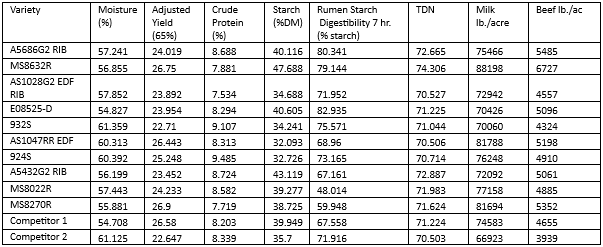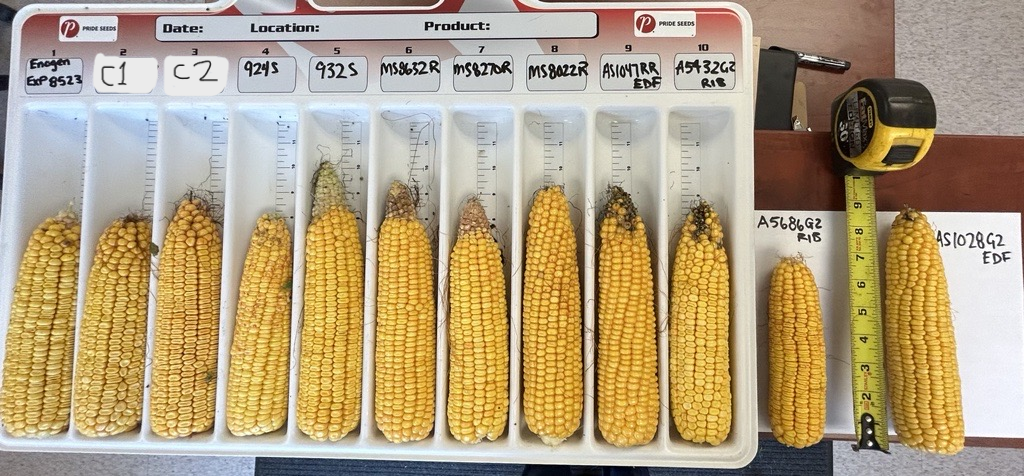Enogen Corn - How These New Traits Will Change The Silage Game
Have you heard of Enogen corn? Syngenta’s traited corn called Enogen is breaking into the Western Canadian market. Working with nutritionists, Syngenta has created varieties that benefit your herd’s productivity because they contain a highly efficient enzyme. This enzyme, alpha amylase, gives it a step up over other corn varieties because it converts starch into simple sugars quicker. These simple sugars are the energy source that cattle use to produce milk and beef, making it a great choice for all cattle operations.
This past season, we were able to see Enogen corn up close in one of our silage trials. Enogen was put up against our other trusted silage corn varieties from PRIDE, Maizex, and Northstar Genetics. We are happy to offer Enogen because we feel like Syngenta focuses on the cattle when creating these varieties, much like our other trusted companies that we offer. There were some competitor varieties in the trial that we feel have missed the mark with their silage varieties because they are a spin off of grain varieties.
Looking at the results of our trial, Enogen showed us some promising feed values. Starch values are important because starch is one of the energy sources animals use for production and maintenance. With starch percentage, rumen starch digestibility is important to look at too. This is the amount of starch digested in the rumen after 7 hours. Food sits in the rumen for 7-8 hours so the higher the amount of starch digested after 7 hours will mean more starch has been degraded and converted into energy, producing more beef or milk. It is important to have a good starch digestibility number because starch is useless unless it is degraded into the simple sugars.
But why grow Enogen? Many studies from Kansas State University (KSU) and University of Nebraska-Lincoln (UNL), who have both worked with Enogen for many years, have shown many benefits for both beef and dairy operations. The alpha-amylase enzyme allows starch to be converted into sugars more efficiently and faster. This fast conversion provides easier starch digestibility, increasing total tract digestion and overall utilization of the grain. Therefore, more energy is available per pound of feed consumed, increasing feed efficiency. The university’s studies have shown that Enogen increased feed efficiency by 5% in cattle, leading to lessening feed costs because there is improve digestibility without increasing dry matter intake.
We all want better silage quality and Enogen can improve both quality and consistency of the pile. Enogen contains higher levels of acetate that can act as a preservative. This allows Enogen to have more available nutrients from day one after harvest and for more than eight months in the pile. Other varieties take 157 days to match Enogen’s starch digestibility once in the pile.
Like previously mentioned, Enogen corn has multiple options for harvest, as silage, grain, or high moisture corn. This flexibility makes Enogen a good fit for dairy operations, feedlots, and cow calf herds. Beef producers will benefit from the increase in average daily gains that Enogen can result in. The enzyme, alpha-amylase, makes starch easier to digest throughout the whole digestive tract. More total tract digestion improves starch utilization, resulting in more available energy to produce more beef. Studies have shown starch fecal output was decreased with Enogen corn, meaning more starch is retained and utilized, then converted to energy and, again, to produce more beef.
Enogen is known to increase the feed value, and potential energy, of silage in the ration. Better animal performance will be the result of exploiting this increased energy potential. Improved digestibility, because Enogen makes starch digestion easier, will lead to more energy available for milk production. KSU and UNL studies of milk protein and lactose showed when Enogen was included in the ration, these factors increased significantly. Milk yield also was seen to increase while dry matter intake decreased when cattle were fed Enogen.
DSAG is excited about getting Enogen in the hands of our customers and getting a better feel of what Enogen has to offer to our cattle producers. If you want improved feed efficiency and lower feed costs, less spoilage at the pile, or more yield out of your herd, milk or beef, then Enogen could be a great fit on your farm.
If you want to learn more, come see us at Ag Days or contact Annabelle at 204-208-4006.
~Annabelle Calcott


